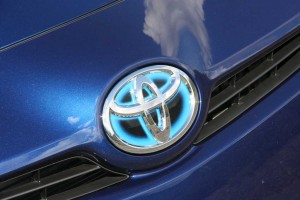
Toyota's operations in Japan have been impacted by the recent earthquake there. U.S. operations are unaffected for now.
In the wake of a devastating series of earthquakes in Southern Japan, automotive giant Toyota will suspend vehicle production across the country in the coming days due to an anticipated shortage of parts and components.
Production is tentatively scheduled to return to normal by next Friday, according to the maker, though Toyota said that could change if deliveries continue to be disrupted. For the moment, a senior U.S. official said Toyota’s American plants are “unaffected.”
The major earthquake and subsequent tsunami that struck Northern Japan in 2011 also caused serious disruptions to the Japanese auto industry, Toyota and most of its domestic competitors, including Honda and Nissan, suffering extensive production delays through the end of the year. The latest tremblors, so far, do not appear to have caused nearly as extensive a problem.
That said, the series of quakes has cost a number of lives and caused extensive injuries and property damage in the region around the city of Kumamoto. But the impact is being felt much further away, with a number of different manufacturers reporting delays in operations across Japan. That includes not only Toyota but the consumer electronics giant Sony.
Among other automakers, Honda will keep a motorcycle plant near Kumamoto closed through Friday. Nissan has all of its plants operating this week.
In Toyota’s case, the parts shortage began with a Monday morning shutdown at its assembly plant in Kyushu, about 95 miles north of Kumamoto. That factory produces vehicles under the Lexus brand. But the closures area scheduled to hit plants in central and northeastern Japan that manufacture Toyota, Daihatsu and Hino truck models.
None of the Toyota plants experienced damage from the quakes but the disaster has hit supplier facilities and also disrupted shipping routes.
(Toyota touts fuel cell as zero emission answer. For more, Click Here.)
That mirrors what happened in 2011 after the massive earthquake struck northern Japan. In that instance, a number of automotive plants were damaged by the temblor. The impact, complicated by the subsequent tsunami and meltdown at the Fukushima nuclear plant continued through early 2012.
Most of the Japanese auto industry was affected at that time. So far, no other automaker has expressed the need to cut production as a result of this past week’s series of earthquakes, however.
In part, that reflects extensive changes Japanese automakers have made since 2011, in many cases moving both parts and vehicle production off the disaster-prone home islands.
Even Toyota operations abroad were impacted in 2011, however, as Japanese-made engines and other components used worldwide suddenly fell into short supply.
(Click Here for details Toyota teaming up with Clemson students for uBox.)
As for the latest earthquake, Scott Vazin, the head of U.S. public relations for Toyota, told TheDetroitBureau.com that, “At present, our production facilities outside Japan remain unaffected.”
But the longer production is cut the more likely the impact will be felt globally. Japanese plants account for about 40% of total Toyota vehicle production, almost half of that going for export.
While Japanese plants produce a number of Toyota and Lexus models for export, Vazin said that the supply of vehicles destined for the U.S. is “unaffected at this time. Still a bit early to fully assess, but so far, so good.”
Along with Sony and Toyota, other companies reporting production problems in the wake of the recent earthquakes include Mitsubishi Electric, Renesas and Fujifilm as well as tire manufacturer Bridgestone.
(To see more about Toyota adding a third autonomous vehicle center, Click Here.)
This is the second time this year Toyota was forced to curtail production in Japan. In February, the maker had to halt operations briefly following a fire at a steel supplier’s plant. Global production was down about 4% during the first two months of this year.
